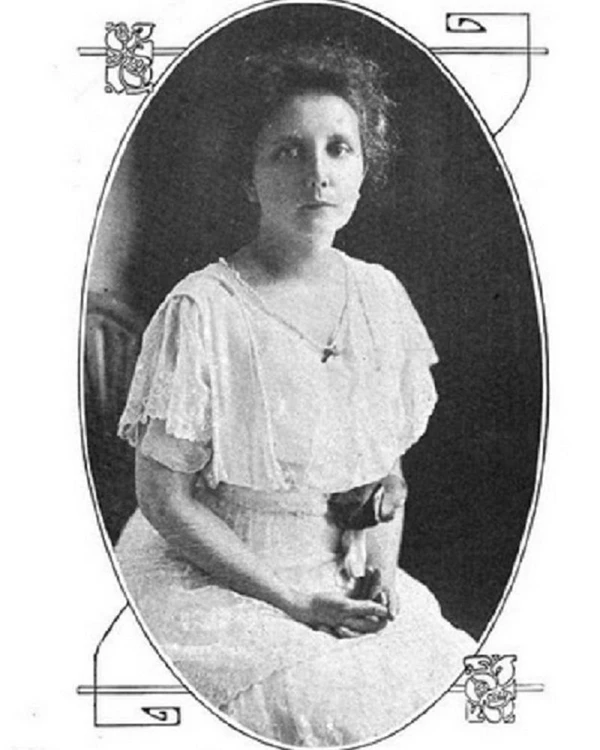Last updated: September 15, 2021
Person
Mabel Lloyd Ridgely

Public Domain
The fight for women’s suffrage in the United States was a long one, and even though it culminated in August of 1920 with the ratification of the 19th Amendment by Tennessee, the efforts of Mabel Lloyd Ridgely meant that it was almost Delaware, not Tennessee, that cast the deciding vote in favor of extending the vote to women across the nation.
Born Mabel Lloyd Fisher in Washington DC on April 13, 1872, her family had a long history of involvement in Delaware and national politics. In 1893 she married the judge Henry Ridgely, changing her name to Mabel Lloyd Ridgely. Together they had a daughter, Phillipa Lloyd Ridgely.
Ridgely was active in the political and organizing spheres by the first years of the 1900s. During the First World War she chaired the Delaware chapter of the Woman’s Liberty Loan Committee, helping to fund the American war effort. By 1919 she was the president of the Delaware Equal Suffrage Association, a fateful year as it was then that the United States Congress passed the 19th Amendment, granting women the right to vote across the country.
However, just because the Amendment was passed by both houses of Congress, that did not mean it went into effect. Being a constitutional Amendment, to become official law, it had to be ratified by three quarters of the states. This meant that out of the then 48 states of the country, 36 of their state legislatures would have to vote “yes” before the 19th Amendment became law. The political struggle saw both pro- and anti-women’s suffrage forces mobilized across the country. Nevertheless, by the end of 1919, 22 states had ratified the 19th Amendment, and tensions began to grow in those states that had yet to vote.
In Delaware, Ridgely worked tirelessly with other organizers and activists to convince the state legislature to vote “yes”. By tying the patriotism demonstrated by American women during the First World War, such as highlighting funding efforts already discussed and service within the armed forces in auxiliary organizations, as well as arguments based on equality and freedom, Ridgely and others were making progress within Delaware. Their efforts did not go unopposed however, and many of the most prominent opponents of women’s suffrage were female themselves.
As the date for the vote neared, both sides held large and numerous rallies in the capital of Dover. Working with one of the founders of the National Women’s Party, Florence Bayard Hilles, Ridgely strove to convince as many powerful and influential politicians as she could to ratify the 19th Amendment. She and her allies even went so far as to bring Eamon DeValera, the leader of the newly independent Irish Free State, to Dover to argue in favor of women’s suffrage to the large immigrant Irish community in the city. In a somewhat less considered move, they temporarily kidnapped the chairman of a Delaware House Committee to stop him from casting a “no” vote.
Despite their efforts, and even though the Delaware senate had voted in favor just a few weeks before, on June 5th of 1920 the Delaware house adjourned without voting on ratification, leaving the issue effectively defeated in the state. Though the First State had the opportunity to be the final state needed to extend the franchise to women across the country, that honor would instead go to Tennessee, which voted to ratify the 19th Amendment that August, becoming the 36th and thus last state needed to make enact it as law.
Ridgely continued to serve in the public spotlight for much of the rest of her life. After the 19th Amendment was ratified Ridgely served as the first president of the Delaware League of Women Voters. Her lifelong passion for historical conservation led to her also serving as president of the Public Archives Commission in Delaware, where she oversaw the preservation both the Old State House and the John Dickinson Plantation, as well as founding the Delaware State Archives. Old Dover Days, an annual festival celebrating Dover and Delaware history that is still celebrated today was founded by Ridgely, and she authored a book about her husband’s ancestors in colonial era Delaware.
Ridgely died at the age of 89 in 1962, leaving a legacy in both Delaware and national history. Her impact continues to be felt through the organizations she directed, the historical resources she preserved, and the movement she helped to lead.
Reflection Questions
- What do you think of Mabel Lloyd Ridgely’s efforts to push for women’s suffrage? Do you agree with her tactics and goals?
- What movement would you be willing to invest time and energy in to? What would be the goal of your movement and who would it affect?
Sources
"Chapter VIII: Delaware." In History of Woman Suffrage, Vol. 6: 1900-1920, edited by Ida Husted Harper, 95-112. New York, NY: National American Woman Suffrage Association, 1922.
Lindenmuth, Janet. 2012. “The 19th Amendment in Delaware.” Widener University Law Library Blog. https://blogs.lawlib.widener.edu/delaware/2012/03/19/the-19th-amendment-in-delaware/.
Reed, Paula, and Edith Wallace. 2019. A Historic Saga of Settlement and Nation Building: First State National Historical Park Historic Resource Study. New Castle, DE: National Park Service.
Willis, Meghan. "Biographical Sketch of Mabel Lloyd Fisher Ridgely". Biographical Database of NAWSA Suffragists, 1890-1920. Alexander Street Documents.
